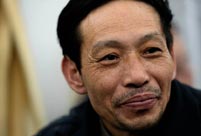At 10,000 yuan per hour, Kuomintang member and former Taiwanese legislator Chiu Yi could be one of the most in-demand speakers on the Chinese mainland.
After retiring as a legislator, Chiu seems to have shifted the main focus of his work onto the mainland. In the past week, he has spent six days in Shenzhen, Xiamen and Fuzhou. He is a commentator for several TV stations, and employed by at least eight enterprises as executive director.
He has been offered professorships in several universities in Xiamen, Shenzhen and Xi'an. According to reports, a female professor from a Xi'an university even followed Chiu and attended almost all of his speeches in different cities to persuade him to accept her university's invitation.
"They realized my value. Wherever I appeared, local political leaders would come to meet and welcome me," Chiu confidently told the Global Times from a presidential suite in a five-star hotel in Xiamen, Fujian Province.
Undeniably, the politician's popularity on the mainland is closely connected with his presence on Weibo. Since he opened his real-name Weibo account in November 2011, he has made thousands of posts, mainly related to hot social issues on the mainland, and drawn 1.42 million followers.
"My popularity on the mainland can be attributed to political correctness," Chiu, a promoter of cross-Straits reunification, told the Global Times.
The rise of Weibo and closer cross-Straits ties have resulted in an increasing number of Taiwan politicians, including Frank Hsieh Chang-ting, a former member of Taiwan's opposition Democratic Progressive Party (DPP) and Hong Zhikun, a rising star of the DPP, opening accounts on Weibo, drawing in a large number of followers on the Chinese mainland. They either want to communicate with people on the opposite strait, or attempt to make some political gains by using Weibo.
Their levels of success on the mainland have varied greatly, depending on their political positions.
For DPP member Hong Zhikun, his provocative remarks about the political system on the mainland and close connections with dissidents have made him a thorn in the side of the authorities. He eventually disappeared from Weibo after he tried dozens of times to open new accounts.
"As the opposition party in Taiwan, people like Hong have to win over the hearts of Taiwanese by visiting dissidents in the mainland and poke into sensitive issues to win the support of separatists," Li Fei, deputy director of the Taiwan Research Center of Xiamen University, told the Global Times.
 |
 A 60-hour journey home
A 60-hour journey home Int'l Snow Sculpture Art Expo
Int'l Snow Sculpture Art Expo Highlights of China's air force
Highlights of China's air force Airline crew stage flashmob dance at Kunming airport
Airline crew stage flashmob dance at Kunming airport Top15 countries to retire to in 2014
Top15 countries to retire to in 2014 Hot supermodel's new photo album released
Hot supermodel's new photo album released Asia's heaviest box girder finishes 'rotation' in Wuhan
Asia's heaviest box girder finishes 'rotation' in Wuhan Completed facade of People's Daily new headquarters
Completed facade of People's Daily new headquarters Chinese-branded car passes North America standard safety test for the first time
Chinese-branded car passes North America standard safety test for the first time Li Na beats Bouchard to reach Australian final
Li Na beats Bouchard to reach Australian final  Explore the sources of PM 2.5
Explore the sources of PM 2.5 Highlights of Chinese airborne troops'exercises
Highlights of Chinese airborne troops'exercises  'Living in ice house' competition held in central China
'Living in ice house' competition held in central China  Chinese figure in Oscar nominations
Chinese figure in Oscar nominations  Top ten aerospace events in China 2013
Top ten aerospace events in China 2013Day|Week|Month